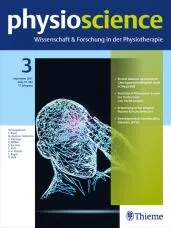Der Artikel ‘Ergebnisse einer deutschlandweiten Umfrage über Beratung zu lebensstilbezogener Verhaltensänderung (BzlV) in der physiotherapeutischen Versorgung – eine Querschnittstudie’ von den Autoren Anna Roidl, Anna Gabriel und Jürgen Beckmann wurden in dem Journal "Physioscience" veröffentlicht: https://doi.org/10.1055/a-1384-0183
Abstract:
Background
It is unclear to which extent physiotherapists in Germany incorporate lifestyle related behaviour change counselling (BCC) into their routine healthcare practice and if they have the required professional competences.
Objective
To assess physiotherapists general attitudes towards health promotion, as well their practices, competences and the perceived barriers for the implementation of lifestyle related BCC.
Method
A nationwide online survey among German physiotherapists was conducted. Physiotherapists were asked about their general attitudes towards health promotion, as well their practices, competences and the perceived barriers for the implementation of BCC. Data was analysed descriptively and a statistical comparison between academic/non-academic physiotherapists was performed using the Mann-Whitney-U test.
Results
511 physiotherapists participated in the online survey. 413 questionnaires were included in the descriptive analysis (mean age: 36.4 (± 10.88 SD) years, female/male: 281/132). 92.7 % of the physiotherapists considered health promotion as a fundamental part of their role and 93.4 % agreed, that they should promote a healthy lifestyle. The lifestyle related risk factor that respondents assessed (a) and counselled (b) most frequently was physical inactivity (a: 89.8 %; b: 91.4 %). Physiotherapists rated their competences towards BCC as low to moderate. Academic physiotherapists rated their competences significantly better than non-academic physiotherapists (W = 8253.5, p = 0.001, r = 0.182). The most frequently mentioned barriers for lifestyle related BCC were external barriers, including a lack of time (64.9 %) and a lack of remuneration (70.5 %).
Conclusion
Overall, physiotherapists own a positive attitude towards health promotion and consider lifestyle related BCC as important. Nevertheless, up-to-date there are several barriers, which hinder physiotherapists from incorporating lifestyle related BCC in their routine healthcare practice. If they should contribute more to health promotion in Germany, a supportive setting needs to be developed and adequate education has to be adopted.
